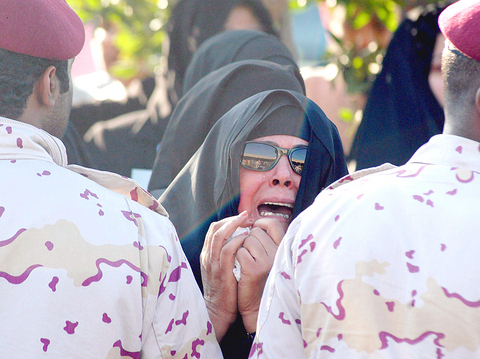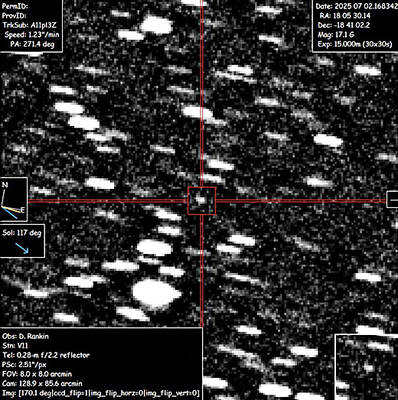Hours after Kuwait's longtime ruler died on Sunday, officials announced that the crown prince had been elevated to the post of emir, heading off a short-term crisis, but raising longer-term questions about leadership of the country, one of the world's richest in oil.
Thousands of people turned out to mourn the death of the emir, Sheik Jaber al-Ahmad al-Sabah, who ruled for almost three decades. The tremendous funeral procession stretched far behind the flag-draped body as it was carried to a final, unmarked grave. Jaber, 79, died after a long illness.
Kuwait announced a 40-day period of mourning, and government offices will close for three days. Flags were lowered to half-staff.

PHOTO: EPA
But the government also moved to end any speculation about the line of succession, following the constitutional instruction to make the crown prince, Sheik Saad al-Abdullah al-Sabah, the next emir.
The new emir, however, is 75, in ill health and by many accounts physically incapable of governing. He would be expected to nominate the next crown prince -- but the decision will, instead, probably be made by Kuwait's inner circle, primarily members of the ruling family and diplomats political analysts said.
Most analysts said they expected the prime minister, Sheik Sabah al-Ahmad al-Sabah, 75, who has run the day-to-day affairs of the country since 2003 when Saad no longer could, to be named the next crown prince.
But the change in leadership could exacerbate tensions between two branches of the ruling family that share power and possibly aggravate a generational split between the younger princes, who want to ascend in the power structure, and the elder family members, political analysts said.
That leaves uncertainty over the future leadership of a country that controls one-tenth of the world's known oil reserves and is a crucial Persian Gulf ally of the US.
"It is going to be a difficult situation," said Ghanim Al-Najjar, a political science professor at Kuwait University. "There is no consensus on anything."
The potential problems began to emerge in public last year, when a senior member of the ruling family expressed concern that the emir and the crown prince were both ill -- raising speculation that the prime minister would leapfrog over the crown prince. The prime minister, who is fitted with a pacemaker, insisted that that would not occur.
Now political analysts said that while he was expected to become the next in line, there was no certainty he would also retain the post of prime minister. That could lead to jockeying for power within the ruling elite.
While the political handicapping had begun, the attention of most Kuwaitis on Sunday was focused on the funeral for the emir who led them through the turbulent years of the Iran-Iraq war, through the occupation of their country by Iraqi forces, and through the general turmoil that continues to buffet the region.
Following afternoon prayer on Sunday, a white van carrying the body of the emir cut through dense masses of weeping Kuwaitis waiting at the Sulaibikhat Cemetery, the largest public Sunni Muslim cemetery in Kuwait.
The security officers held hands forming a human wall and struggled to keep the mourners from approaching the emir's body, which was wrapped in a Kuwaiti flag and placed in an open box.
Waves of men wearing the traditional checkered red-and-white and plain-white Arab head coverings rushed to participate in carrying the emir's coffin on their shoulders.
Others stretched their hands up high to take pictures of the coffin with their cellphone cameras.
Many women standing at the back of the cemetery, dressed in black, broke down in tears.
Some of them carried photos of the late emir, and a number were accompanied by their young children.
As Kuwaiti satellite television broadcast the funeral procession, the announcers heaped praise on the emir.

Two former Chilean ministers are among four candidates competing this weekend for the presidential nomination of the left ahead of November elections dominated by rising levels of violent crime. More than 15 million voters are eligible to choose today between former minister of labor Jeannette Jara, former minister of the interior Carolina Toha and two members of parliament, Gonzalo Winter and Jaime Mulet, to represent the left against a resurgent right. The primary is open to members of the parties within Chilean President Gabriel Boric’s ruling left-wing coalition and other voters who are not affiliated with specific parties. A recent poll by the

TENSIONS HIGH: For more than half a year, students have organized protests around the country, while the Serbian presaident said they are part of a foreign plot About 140,000 protesters rallied in Belgrade, the largest turnout over the past few months, as student-led demonstrations mount pressure on the populist government to call early elections. The rally was one of the largest in more than half a year student-led actions, which began in November last year after the roof of a train station collapsed in the northern city of Novi Sad, killing 16 people — a tragedy widely blamed on entrenched corruption. On Saturday, a sea of protesters filled Belgrade’s largest square and poured into several surrounding streets. The independent protest monitor Archive of Public Gatherings estimated the

Irish-language rap group Kneecap on Saturday gave an impassioned performance for tens of thousands of fans at the Glastonbury Festival despite criticism by British politicians and a terror charge for one of the trio. Liam Og O hAnnaidh, who performs under the stage name Mo Chara, has been charged under the UK’s Terrorism Act with supporting a proscribed organization for allegedly waving a Hezbollah flag at a concert in London in November last year. The rapper, who was charged under the anglicized version of his name, Liam O’Hanna, is on unconditional bail before a further court hearing in August. “Glastonbury,

FLYBY: The object, appears to be traveling more than 60 kilometers per second, meaning it is not bound by the sun’s orbit, astronomers studying 3I/Atlas said Astronomers on Wednesday confirmed the discovery of an interstellar object racing through the solar system — only the third-ever spotted, although scientists suspect many more might slip past unnoticed. The visitor from the stars, designated 3I/Atlas, is likely the largest yet detected, and has been classified as a comet, or cosmic snowball. “It looks kind of fuzzy,” said Peter Veres, an astronomer with the International Astronomical Union’s Minor Planet Center, which was responsible for the official confirmation. “It seems that there is some gas around it, and I think one or two telescopes reported a very short tail.” Originally known as A11pl3Z before